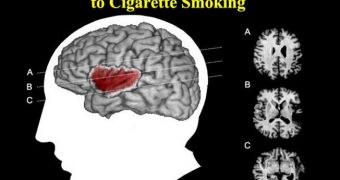In a new scientific study, experts were able to determine that the brains of patients trying to renounce cigarettes exhibited entirely different activity patterns when the people were using two anti-smoking drugs, called bupropion and vareniclin.
Apparently, these two substances are capable of triggering modifications in the activity patterns of the human brain. Researchers say that this is why the chemicals have such an influence on patients' abilities to face the cravings that they have.
One of the worst enemies that a person trying to quit smoking has is the smoking cue, an event or circumstance that has come to be unwittingly associated with smoking. Most of the time, when a smoker sees the cue, he or she may unintentionally reach for a cigarette.
Details of the new investigation were published in two separate research papers, which appeared in the latest online issue of the esteemed scientific magazine Archives of General Psychiatry, one of the JAMA/Archives journals.
“Environmental cues associated with nicotine reinforcement induce cigarette craving, which propagates smoking habits in smokers and relapse in abstinent individuals,” the authors of one of the articles say.
“Human brain imaging studies using functional magnetic resonance imaging (fMRI) and positron emission tomography (PET) scanning have provided insight into brain regions associated with cue-induced cigarette craving,” they add in the paper background.
“Nicotine-dependent smokers exhibit activation in brain regions related to attention (prefrontal cortex), emotion (amygdala), reward (ventral tegmental area) and motivation (striatum) while viewing cigarette-related cues,” the team adds.
Bupropion is currently one of the most effective drugs in this regard. Though it was originally developed as an antidepressant, the chemical is now being used around the world, as one of the main methods of addressing and fighting tobacco addiction.
In a study conducted by professor Christopher S. Culbertson, PhD, of the University of California in Los Angeles (UCLA), it was revealed that bupropion proved effective in decreasing cue-induced, tobacco-related cravings in as little as 8 weeks.
“These results demonstrate that treatment with bupropion is associated with an improved ability to resist cue-induced craving and a reduction in cue-induced activation of limbic and prefrontal brain regions,” experts with the research say.

 14 DAY TRIAL //
14 DAY TRIAL //